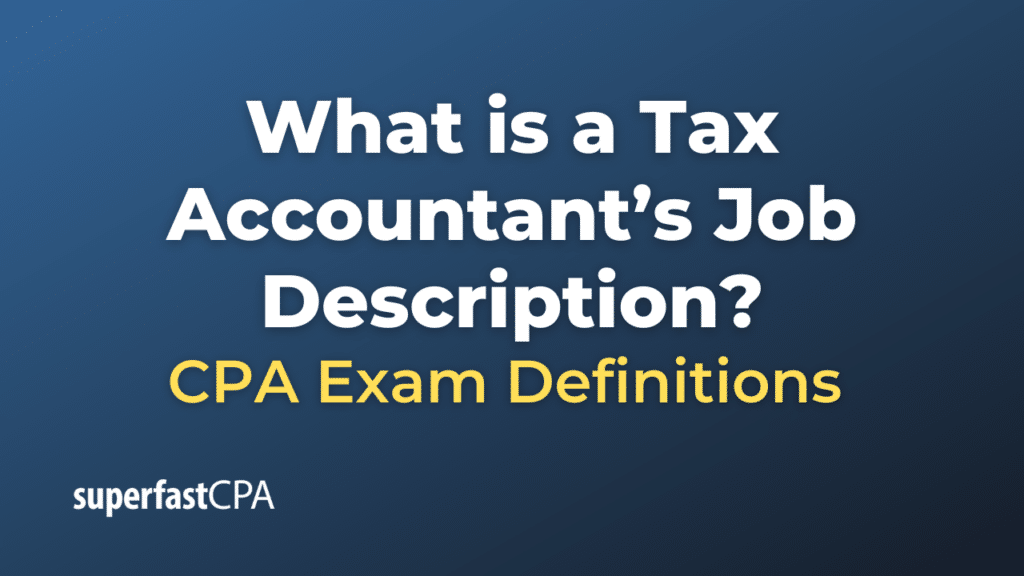Tax Accountant’s Job Description
A tax accountant specializes in assisting individuals, businesses, and organizations with their tax obligations, ensuring compliance with local, state, and federal tax regulations while taking advantage of any deductions, credits, or other opportunities to minimize tax liability. Their responsibilities can vary based on their specific role, clientele, and place of employment.
Job Description for a Tax Accountant:
Primary Duties and Responsibilities:
- Tax Compliance:
- Prepare and file federal, state, and local tax returns for individuals, businesses, and organizations.
- Ensure timely and accurate filing of tax forms.
- Verify financial documents and information provided by clients to determine tax liability.
- Tax Planning and Strategy:
- Provide advice on tax implications of business decisions and financial transactions.
- Identify opportunities to reduce tax liability through allowable deductions, credits, and other incentives.
- Stay updated on changing tax regulations and inform clients of any pertinent changes that might affect their financial or tax status.
- Research and Analysis:
- Research and interpret tax laws relevant to specific client scenarios.
- Assist with internal audits and assessments.
- Analyze financial documents to identify potential tax savings or areas of concern.
- Communication:
- Collaborate with clients to gather necessary financial data and documentation.
- Liaise with tax authorities in the event of audits or inquiries.
- Advise and update clients on tax compliance, planning, and potential implications of various financial decisions.
- Record Keeping:
- Maintain organized, accurate, and updated records of all tax documents and correspondence.
- Ensure clients’ documentation is stored securely and is easily accessible for future reference or audits.
- Continuous Learning:
- Attend seminars, workshops, and training sessions to stay updated on the ever-evolving tax code and regulations.
- Pursue continuing education requirements as mandated by professional accounting associations or licensing bodies.
Qualifications and Skills:
- Education: A bachelor’s degree in Accounting or a related field is typically required. A master’s degree in taxation or a related field is often preferred.
- Certifications: Certifications such as Certified Public Accountant (CPA) or Enrolled Agent (EA) can be beneficial.
- Strong analytical and problem-solving skills.
- Detail-oriented with high accuracy in work.
- Familiarity with tax software and related applications.
- Good communication skills for liaising with clients, tax authorities, and other stakeholders.
Work Environment:
- Tax accountants may work for accounting firms, corporations, government agencies, or as independent consultants.
- The role can be demanding, especially during tax season, which might require extended hours.
This is a general overview, and the specifics can vary depending on the country, region, or specialization within the field of taxation.
Example of a Tax Accountant’s Job Description
Here’s a hypothetical example of a tax accountant’s role in a real-world scenario:
Scenario: Jessica is a tax accountant at a mid-sized accounting firm in New York. One of her clients, Mike, is a small business owner who runs a local chain of fitness centers.
1. Tax Compliance:
- In January, Jessica sends Mike a checklist of the financial documents she needs to prepare his business tax returns.
- After receiving the documents, she reviews them for accuracy and completeness, preparing both federal and state business tax returns for Mike’s fitness centers.
2. Tax Planning and Strategy:
- In March, Mike considers opening a new fitness center in a neighboring state. Before finalizing the decision, he consults Jessica.
- Jessica analyzes the tax implications of this expansion. She informs Mike about the different state taxes he might incur and provides an estimate of his potential tax liability.
3. Research and Analysis:
- Mike inquires about a tax credit he heard of, which benefits businesses that retrofit their facilities to be energy efficient.
- Jessica researches the specifics of this tax credit, determines its applicability to Mike’s business, and calculates the potential savings.
4. Communication:
- Jessica frequently communicates with Mike to update him on tax matters and to clarify any queries. She also prepares a quarterly tax newsletter for all her clients, informing them of any significant tax law changes.
5. Record Keeping:
- Jessica uses tax software to store all of Mike’s tax filings securely. She also keeps a physical file with copies of all tax documents and correspondence related to Mike’s account.
6. Continuous Learning:
- Jessica attends a tax seminar in June, where she learns about upcoming changes in federal tax regulations and new strategies for tax planning for businesses. She implements this new knowledge in her subsequent consultations.
This scenario demonstrates the multi-faceted role of a tax accountant, who not only ensures compliance but also acts as a valuable advisor to clients, helping them make informed financial decisions.













